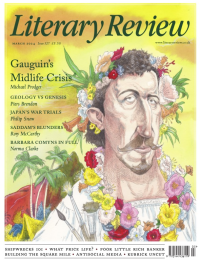Tim Bale
Who Says Things Can Only Get Duller?
Keir Starmer: The Biography
By Tom Baldwin
William Collins 448pp £25
When it comes to Labour leaders of the opposition, Tom Baldwin knows what he’s talking about. For five gruelling and ultimately fruitless years between 2010 and 2015, he was head of communications for the Labour Party and a senior adviser to its leader, Ed Miliband. As a veteran journalist – he has been deputy political editor, Washington bureau chief, chief reporter and assistant editor at The Times – he is also an experienced interviewer and effective writer. It’s no surprise, then, that this biography of Keir Starmer, the current leader of the Labour Party, is a well-sourced and well-crafted book. It also manages – just – to stay on the right side of the line that separates sympathetic biography from hagiography.
Starmer’s political trajectory is unusual: he wasn’t elected to Parliament until the age of fifty-two, following a legal career in which he rose to the post of Director of Public Prosecutions. Accordingly, a good half of the book focuses on his life before he was selected (with a little help from the Labour Party hierarchy) to fight the safe north London seat of Holborn and St Pancras in 2015. Anyone who pays attention to British politics will be familiar with the facts that Starmer’s father, Rod, was a toolmaker and his mother, Jo, was a nurse – possibly to the point of rolling their eyes as he mentions it yet again (apparently, we learn, on the advice of Barack Obama). But Baldwin does a very good job of giving a detailed picture of his upbringing in the Surrey village of Hurst Green. Indeed, the book’s treatment of his relationship with his buttoned-up, slightly controlling (some might say chippy) father and his more emollient mother, who had to cope with a serious chronic illness while bringing up four children in sometimes tight financial circumstances, is genuinely touching.
All this has had a lasting effect on Starmer. He is fiercely protective of the privacy of his family and is acutely aware of how much of a struggle life can be for ordinary people, even in ostensibly well-off parts of the country. It has also given him a ferocious

Sign Up to our newsletter
Receive free articles, highlights from the archive, news, details of prizes, and much more.@Lit_Review
Follow Literary Review on Twitter
Twitter Feed
It wasn’t until 1825 that Pepys’s diary became available for the first time. How it was eventually decrypted and published is a story of subterfuge and duplicity.
Kate Loveman tells the tale.
Kate Loveman - Publishing Pepys
Kate Loveman: Publishing Pepys
literaryreview.co.uk
Arthur Christopher Benson was a pillar of the Edwardian establishment. He was supremely well connected. As his newly published diaries reveal, he was also riotously indiscreet.
Piers Brendon compares Benson’s journals to others from the 20th century.
Piers Brendon - Land of Dopes & Tories
Piers Brendon: Land of Dopes & Tories - The Benson Diaries: Selections from the Diary of Arthur Christopher Benson by Eamon Duffy & Ronald Hyam (edd)
literaryreview.co.uk
Of the siblings Gwen and Augustus John, it is Augustus who has commanded most attention from collectors and connoisseurs.
Was he really the finer artist, asks Tanya Harrod, or is it time Gwen emerged from her brother’s shadow?
Tanya Harrod - Cut from the Same Canvas
Tanya Harrod: Cut from the Same Canvas - Artists, Siblings, Visionaries: The Lives and Loves of Gwen and Augustus John by Judith Mackrell
literaryreview.co.uk